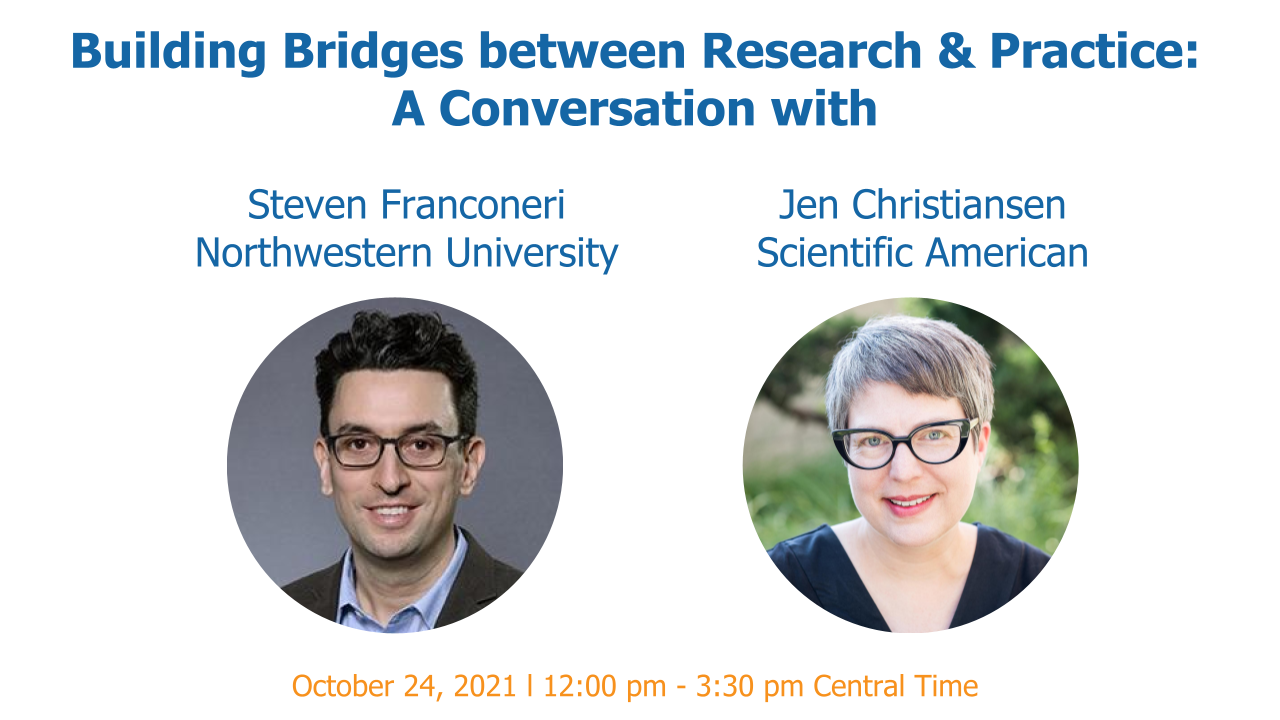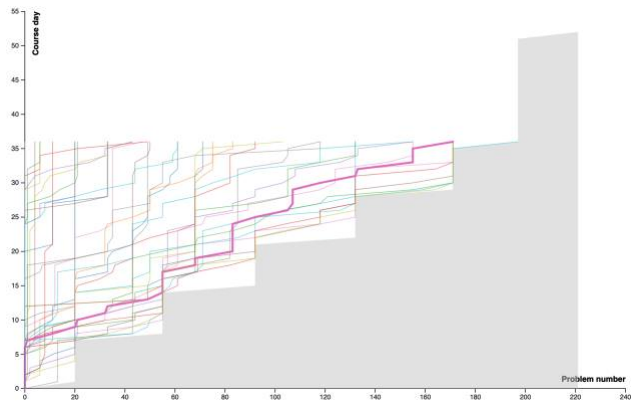
While the visualization field consists of researchers exploring how people perceive information and different data visualization tools and platforms, there is an even larger community of analysts, practitioners, and organizations who are creating data and information visualizations and communicating their work every day. The challenges these groups face communicating their work is often distinct from the research taking place in the academic community.
Most people experience visualization as communication and presentation. The New York Times and other publications regularly release interactive visuals depicting complex datasets including political topics, budgets, and sports. An independent community of visualization practitioners and bloggers has also sprung up, producing and deconstructing visualizations of data of broad interest. Free visualization tools such as D3, Data Wrapper, Tableau Public, and others are available and widely used.
The VisComm workshop brings together practitioners and researchers from a broad range of disciplines to address questions raised by the new and evolving role of data visualization in our everyday lives. We encourage participation from journalists, designers, practitioners, health communicators and others who do not typically attend IEEE VIS.
The workshop will be held remotely and online on Sunday October 24, 12:00 pm to 3:30 pm Central Time.
The VisComm Meetup will be held remotely and online on Wednesday October 27, 2:00 pm to 3:00 pm Central Time.
Join our mailing list/google group! We'll use it for general discussion and updates around visualization for communication.

Building Bridges between Research and Practice: A Conversation with Jen Christiansen and Steve Franconeri followed by Q&A with attendees
Moderated by Jon Schwabish

Paper:
Unfolding the Decision-Making Dynamics of News Visualization Production in China
Qian Ma
Abstract: News visualization is a journalistic form that centers on delivering information through data visualizations...

Late Breaking Work:
A Design Space for Visualization Onboarding in Data-Driven Stories
Morteza Asgari and Thomas Hurtut

Paper:
Know Your Audience: Comprehension of Health Information Varies by Visual Format
Dr. Sabrina Mangal et al.
Abstract: Patient-reported outcomes provide key information about a patient’s health status...

Paper:
Paper Maps: Improving the Readability of Scientific Papers via Concept Maps
Lorenzo Amabili and Nicole Sultanum
Abstract: Given the wealth of scientific publications, perusing papers is becoming a larger and more complex burden...

Paper:
Aesthetics for Communicative Visualization: a Brief Review
Maryam Riahi and Benjamin Watson
Abstract: We present a brief and somewhat selective review of research on the applied value of aesthetics...

Visual Case Study:
Visualizing Student Behavior and Performance in an Online Course
Michael J Parker
Abstract: Online learning has been an area of tremendous growth in recent years...

Late Breaking Work:
Anatomy of a Data Visualization Style Guide
Maxene Graze

Late Breaking Work:
Visualizing Uncertainty Due to Missing Data
Hanne Ida Oberman
VisComm seeks contributions addressing questions including:
We particularly encourage contributors to address and illustrate issues like these with visual case studies that demonstrate the success or failure of communicative visualization projects in data journalism, public health and more. Our goal is to consider a broad range of examples and learn from their design decisions and process.
We invite contributions from any discipline, but particularly encourage journalists and designers to submit their work involving data-based communication or reporting. Scientific contributions concerning visualization for communication are of course welcome, as well.
VisComm has four submission tracks: short papers (research or position), visual case studies, and late-breaking works in progress. Selection criteria are clarity, relevance to the workshop, innovation, and quality of questions for attendees.
We invite submission of research papers between 2 and 6 pages long, including references, with length matching content. Research papers will be reviewed based on how well claims are supported by evidence. Submissions are expected to include all materials and data needed to replicate and reproduce any figures, analyses, and methods. If anything cannot be publicly shared (e.g., for data privacy concerns), state the reason in the paper.
We invite submission of position papers between 2 and 6 pages long, including references, with length matching content. Position papers are problem discussions or statements describing the author's relevant experience and ideas with regards to methods and methodologies for visualization research, and in particular the focus topic of the workshop. Position papers will be selected according to their importance and relevance for the workshop topics and how well they will fit the planned discussions.
We invite practitioners to submit a one-page write-up together with a link to an online piece or a short video. The write-up should explain what you made, why you made it, outcome/responses (both expected and unexpected), etc. The goal is to show the work of journalists, designers, people working for governments or non-profits, etc., who use data to inform and communicate.
The purpose of this category is to present work in progress and receive feedback from attendees.
For research that is in progress, this session will provide a supportive atmosphere for helpful feedback and fresh perspectives on your aims and/or methods. Recommended structure for your one-page submission is: introduction, preliminary methods, preliminary findings (if applicable), and questions for attendees.
For practitioners, this is an opportunity to present contributions that showcase innovative visualizations or provide provocations for new ideas to emerge. Your one-page brief should include project background, design objectives, methods or design process, links to visualization design alternatives, preliminary findings (if available), and questions for attendees.
Your paper, abstract or write-up should take the form of a PDF file, formatted in the VGTC conference style, which has both LaTeX and MS Word templates. However, please replace the statement about IEEE copyright and reprints with the following text: "This work is licensed under a Creative Commons Attribution 4.0 International License."
All submissions should contain full author names and affiliations. If applicable, a short video (up to 5 min. in length) may also be submitted. Submissions will be juried by the organizers. At least one author of each accepted submission must register for the conference (even if only for the workshop). Registration information is available on the IEEE VIS website.
All accepted submissions will be posted on the workshop website.
We expect authors of accepted submissions to post their documents on the Open Science Framework's preprint archive, using the instructions we send. Authors are welcome to post an initial version of their submission earlier. Our OSF workshop papers are not considered archival by IEEE, and may be published elsewhere at a later date. However, we understand that authors from non-engineering disciplines may have different prior publication standards; please contact the chairs if you must publish your accepted submission differently.
Presenting authors can make use of a reduced workshop-only registration fee at IEEE VIS. Additionally, the IEEE VIS Inclusivity & Diversity Scholarship Committee provides complimentary conference registration based on need.
deadlines occur at 11:59 PM in the last timezone on Earth.
At VisComm, we want to provide avenues for collaboration and networking. We are creating a directory of people willing to be contacted about their areas of expertise. The directory will be unveiled during VIS week and thereafter will be available to anyone who signs up for the VisComm email list. Follow this link to add your entry to the directory
The quickest way to contact VisComm's organizers is via their shared email, viscomm_chairs@googlegroups.com
Adriana Arcia, Columbia University
Alvitta Ottley, Washington University in St. Louis
Barbara Millet, University of Miami
Jonathan Schwabish, Urban Institute
Ab Mosca, Northeastern University
Melanie Bancilhon, Washington University in St. Louis
Mollie Hobensack, Columbia University
Quian Ma, University of Miami
Irene Vailikit, University of Miami
2020 schedule, papers and posters